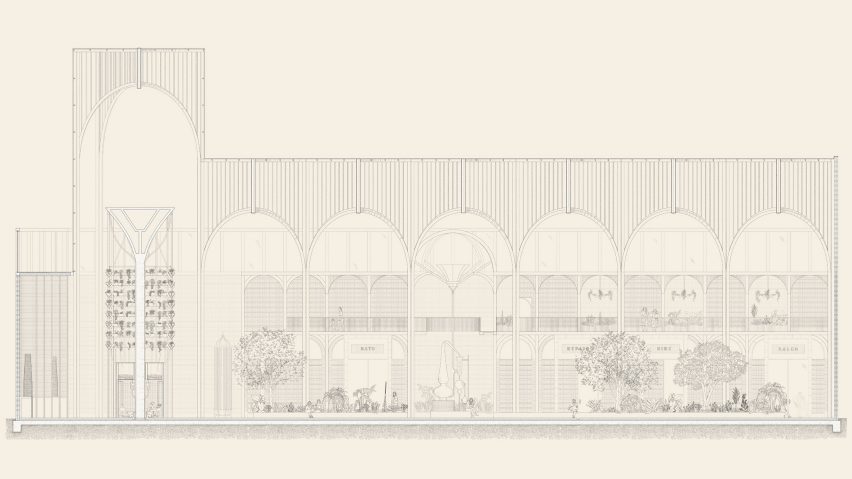University of Westminster graduate Ruth Pearn has designed a concept for a bathhouse, with a tampon recycling scheme, which would alleviate period poverty and combat stigma around menstruation.
Pearn, who was tutored by Clare Carter, Gill Lambert and Nick Wood, designed The New Public Convenience: Hull's Bath House & Lady Garden, as her graduate project on the architecture masters at the University of Westminster.
She reimagined the historic public toilets in Kingston upon Hull, East Yorkshire, to respond to local issues surrounding period poverty and the wider debate about access to bathrooms.
"Recently, within Yorkshire, period poverty has made the headlines. Reports indicate an increasing amount of women and girls cannot afford adequate sanitary protection," Pearn explained.
"For those affected this is not only humiliating and debilitating, but can result in women missing work and girls missing school. The taboos that surround menstruation render many women too ashamed to seek support."
Hull's Bath House & Lady Garden draws from the "material richness, detail and craftsmanship" of the Edwardian and Victorian architecture of Kingston upon Hull's public toilets.
Glazed bricks, imitation marble tiles, and an exposed brass electro-plated steel frame would allude to these historic buildings.
Visible plumbing, steam distillers and heat exchangers set in the building's lanterns and bays would allude to industrial heritage and make the sustainable elements of the system obvious to visitors.
Designed like a 19th century shopping arcade, Hull's Bath House & Lady Garden would provide public toilets, baths and showers, as well as a launderette, salon and clothes hire set in the arches.
A scheme would recycle tampons made from organic cotton into compost to fertilise the plants and flowers growing. The composting process would also be used to heat up water for the public conveniences. Greywater filters would siphon off wastewater for the plants too.
Essential oils would be extracted from the plants and used for making soaps, that would then be sold and the profits reinvested in the running of the building and subsidise the shop dispensing period products.
Set in the city centre, the baths would be accessible and open to all genders in order to foster inclusivity and break down taboos around menstruation.
"These Edwardian and Victorian 'temples of convenience' were conceived as a celebration of plumbing and were long seen as places of civic pride," said Pearn.
"Just as the suffragettes fought for women's toilets in the early 20th century, today the issue of transgender and non-binary rights are again bringing public toilets to the forefront of social debate."
Several other graduate projects this year have aimed to spark debate around gender and access to toilets.
Royal College of Art graduate Hannah Rozenberg developed a digital tool to combat gender bias in architectural space, and Design Academy Eindhoven graduate Elisa Otañez created a portable yellow toilet to protest the lack of public bathroom facilities for women in the Netherlands.

